Protect hydraulics against corrosion, loss of oil quality, poor lubrication & the escape of pollutants.
Have you noticed condensation droplets inside your hydraulic tank or even worse: Rust, free water and dirt in hydraulic oil, poor lubrication, signs of abrasion and an oily smell when the unit is running? The cause: moisture and dirt particles entering your system unhindered every time it draws in air to equalize pressure, plus oil aerosols escaping when it breaths out.
Let‘s face it, if you don‘t do anything about it, you‘re heading for expensive maintenance work and damage to employees and environment.
Luckily, there‘s a solution: the installation of an GIEBEL Adsorber®. It dries and cleans the supply air and prevents pollutants from escaping - saving you maintenance work and money.
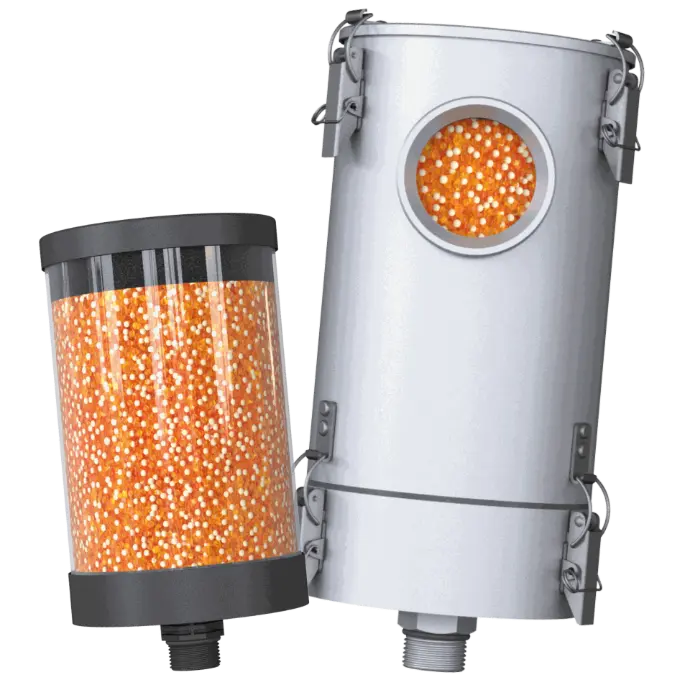
Why water & dirt should be your biggest concern?
When metals react with oxygen and water, this is known as corrosion. It leads to the formation of hard, highly abrasive particles. In hydraulic oil contaminated with water, these metallic impurities trigger an oxidative chain reaction. Free radicals are formed, which attack the hydrocarbon molecules and break down the oil. But that‘s not all: when oil additives react with water, acids are formed that further accelerate the decomposition. Over time, oil properties such as lubricity, viscosity and shear strength change.
With higher flow characteristics, friction points are no longer supplied with the necessary volume of hydraulic oil. Extremely viscous oils, on the other hand, put a strain on the system‘s drive units and reduce efficiency. Oil ageing residues clog valves, sludge formation increases filter requirements and acidification hightens the risk of corrosion of all metallic components, plus impairs the seals.
Preventing the entry of moisture and dirt as well as the formation of corrosion is the top priority in order to operate hydraulic systems for a long time, cost-effectively and with low maintenance! Exactly what our GIEBEL Adsorbers® do!
Breather dryers
Breather dryers adsorb humidity and thus prevent water from entering machines.
Oil mist separators
Oil mist separators prevent oil aerosols and pollutants from escaping machines.
Breather dryers for hydraulics.
D = Disposable
R = Rechargeable
DV = Disposable + Valves
RV = Rechargeable + Valves
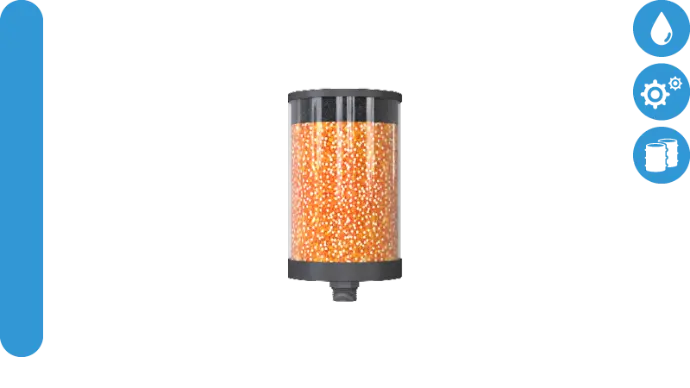
VV-D
Basic breather dryers for hydraulics with constant air exchange & short maintenance intervals.
Disposable
Indoor, outdoor & offshore use
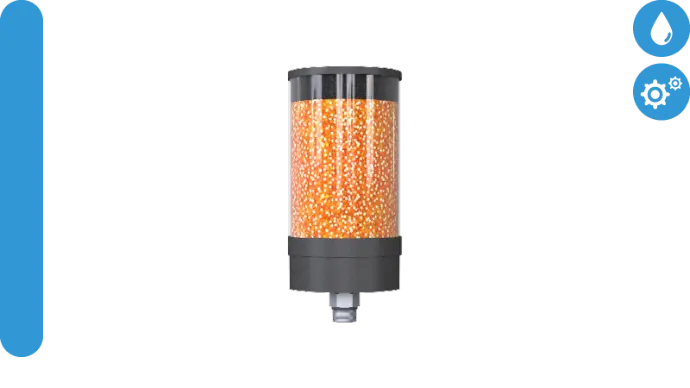
VV-DV
Basic breather dryers for hydraulics with long downtimes & infrequent maintenance intervals.
Disposable
Indoor, outdoor & offshore use

VV-R
Eco breather dryers for hydraulics with constant air exchange & short maintenance intervals.
Rechargeable
Indoor, outdoor & offshore use
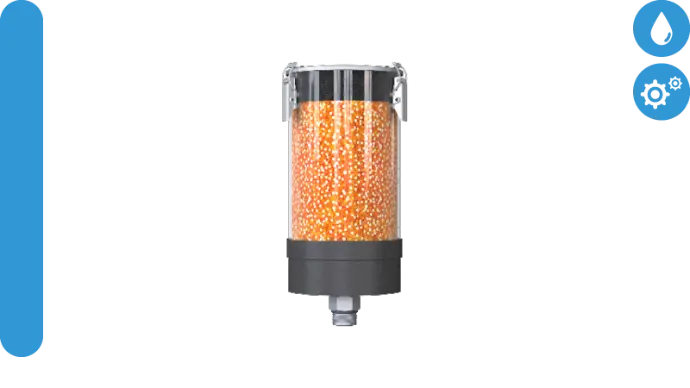
VV-RV
Eco breather dryers for hydraulics with long downtimes & infrequent maintenance intervals.
Rechargeable
Indoor, outdoor & offshore use
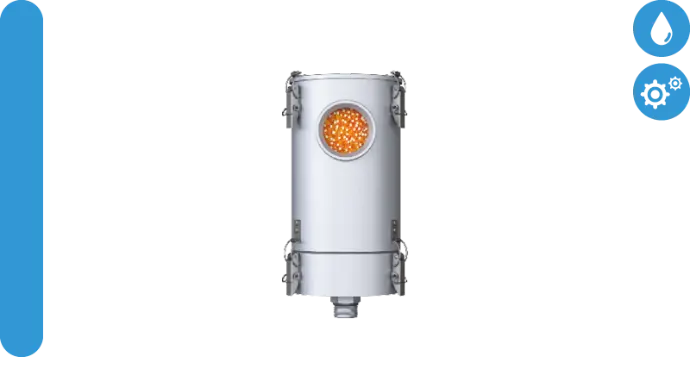
MA-RV
Premium breather dryers for hydraulics operated in harsh environments or with aggressive operating fluids.
Rechargeable
Indoor, outdoor & offshore use according to ATEX
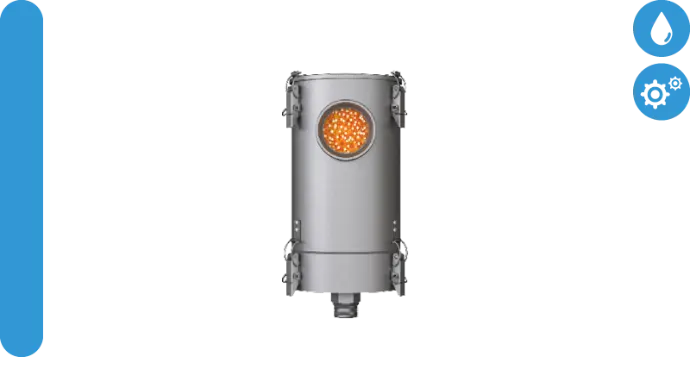
ME-RV
Premium breather dryers for hydraulics operated in harsh environments or with aggressive operating fluids.
Rechargeable
Indoor, outdoor & offshore use according to ATEX
Oil mist separators for hydraulics.
D = Disposable
R = Rechargeable
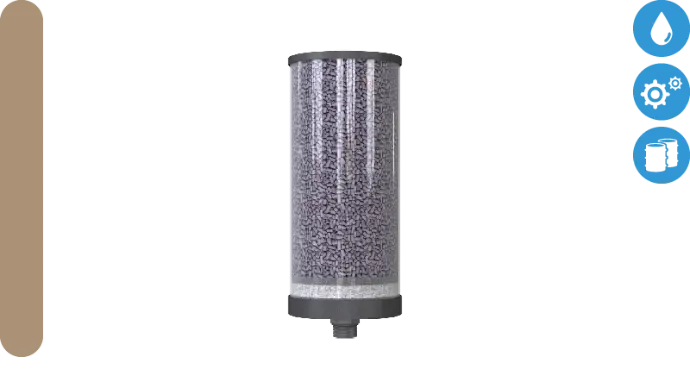
VG-D
Basic oil mist separators for hydraulic testbenches & recirculating oil lubrication systems.
Disposable
Indoor, outdoor & offshore use
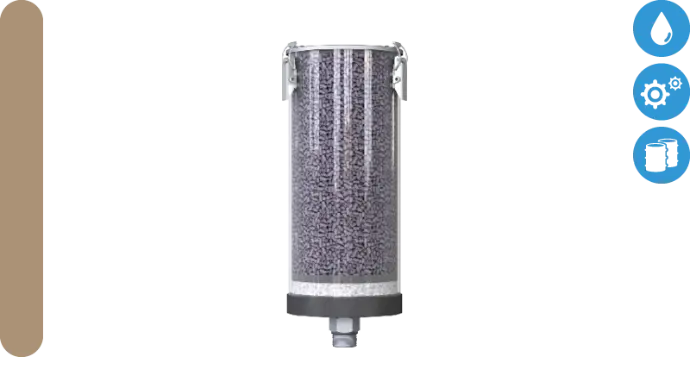
VG-R
Eco oil mist separators for hydraulic testbenches & recirculating oil lubrication systems.
Rechargeable
Indoor, outdoor & offshore use
FAQ regarding hydraulics.
Malfunctions & troubleshooting
Corrosion inside a hydraulic tank is problematic - not just for the tank, but for the entire system. This is because the small, highly abrasive particles flake into the hydraulic oil and migrate through the entire system. In combination with water, they trigger a chain reaction in the oil that increasingly acidifies and degrades the oil and additives. On moving parts and friction points, rust particles act like sandpaper and accelerate wear. In valves and filters they cause blockages.
However, corrosion only occurs where metals can react with water and oxygen. A break in the cooling system, leaking screw connections, water in the fresh oil and the lubricating film on the piston rod are possible culprits. However, the most common cause of moisture ingress and rust formation is a different one: In order to equalize pressure, hydraulic power units continuously draw in air from the environment. Moisture and fine dust particles enter the system with this supply air. If the temperature drops, e.g. when the machine is at a standstill, the moisture condenses on the inner walls of the tank and forms a breeding ground for rust formation.
What you can do: Check the cooling system, the seals and the water content of your oil and use a GIEBEL Adsorber® instead of a classic ventilation hood. It filters moisture from the supply air of your hydraulic unit and thus provides effective protection against corrosion.
Water in hydraulic oil is a serious problem because it changes the oil properties such as lubricity, viscosity and shear strength. This leads to insufficiently supplied friction points, an additional load on the drive units and a reduction in the efficiency of the hydraulics. In combination with rust and dust particles, water promotes further damage such as clogged valves, sludge formation, acidification of the oil and damage to seals.
Moisture can get into your hydraulic oil through a break in the cooling system, leaking screw connections and a high water content in the fresh oil. However, the most common cause of moisture ingress is a different one: In order to equalize the pressure, hydraulic power units continuously draw in air. Moisture and fine dust particles also enter your system with this supply air. If the temperature drops, e.g. when the machine is at a standstill, the moisture condenses on the tank walls and drips into the hydraulic oil.
What you can do: Check the water content of your fresh oil and use a GIEBEL Adsorber® instead of the classic breather cap. It filters the supply air of your hydraulic unit and thus prevents water and dirt from getting into your hydraulic oil.
An oily smell during operation of your hydraulic power unit indicates that oil aerosols are escaping. This is problematic, as oil mist is harmful to both the environment and the health of your employees.
Typically, oil mist escapes via the ventilation cap of the hydraulic unit, whenever the oil level inside the system rises and air is forced out of the system to equalize the pressure.
What you can do: Install a GIEBEL Adsorber® instead of the classic ventilation cap to prevent oil mist from escaping your system. Both aeration dryers and oil mist separators developed specifically for oil separation adsorb oil aerosols by directing the exhaust air from your system through a layer of activated carbon. An upstream oil demister can help you to separate large oil particles before they reach the adsorber in the case of very heavy oil mists. A flange with slosh protection on the other hand is interposed if the system is exposed to swell. It prevents liquid oil or oil splashes from entering the adsorber and thus extends its service life.
Wear, blockages, loss of performance and even system failures - contaminated hydraulic oil is a real danger for your installation. If you discover that your hydraulic oil is contaminated, you need to act quickly. Not only should you consider replacing the oil or cleaning it with the help of an bypass filter system, but also take measures to prevent dust and dirt particles from entering your system in the future.
What you can do: Carry out an oil change or oil cleaning and replace the classic ventilation cap on your hydraulic power unit with a GIEBEL Adsorber®. It filters the supply air to your hydraulic tank, prevents dust and dirt particles as well as moisture from entering the system and increases the service life of your hydraulic oil.
Hydraulic oil & filtration
The purpose of an oil change is to maintain the optimum running performance of a hydraulic system and to remove harmful impurities from the system caused by water, abrasion and dirt particles. How long a hydraulic oil can remain in operation depends largely on the machine and the oil used. A rough guide value is 2000 - 3000 operating hours.
It is advisable to regularly check hydraulic oils for contamination (turbidity, foaming, sludge deposits) through visual inspections and oil analyses. Unusual noises and slower system response times can also indicate the need for an oil change. You should likewise take precautions to prevent moisture and dirt from entering your hydraulic oil to ensure maximum service life and conserve resources.
What you can do: Conduct regular visual inspections and oil analyses and install a GIEBEL Adsorber® instead of a classic ventilation cap. It filters moisture and dirt from the supply air of your hydraulic unit and thus saves you from frequent oil changes.
Contaminated hydraulic oil negatively affects the performance of your hydraulic power unit. Oil properties such as lubricity, viscosity, and shear stability deteriorate, friction points are insufficiently lubricated, drive components are additionally stressed, valves become clogged, seals are attacked, and wear is accelerated.
Visible signs of contamination are a milky, cloudy or dark appearance of the oil, sludge deposits and foaming. Rust formation inside the tank also indicates the presence of moisture and small abrasive rust particles in the oil.
However, if there is water in the oil, this is not necessarily visible to the naked eye, as water is dissolved up to the saturation limit. Only when this limit is exceeded are the water molecules released. They are then finely distributed as a water-oil emulsion, which gives the oil a cloudy and milky appearance. In oils with a high water separation capacity, a free water phase forms below or above the oil layer instead of the water-oil emulsion.
In addition to visual inspections, regular oil analyses are necessary in order to make statements about the quality of a hydraulic oil. To prevent moisture and dirt from getting into your hydraulic oil in the first place, it is advisable to install a GIEBEL Adsorber®. It filters the supply air to your hydraulic tank and thus prevents oil contamination - so that you can get the maximum runtime out of your hydraulic oil.
Dirt in the form of solid particles acts like an abrasive on pumps, valves, cylinders, seals, bearings and sliding surfaces of the hydraulic unit and also causes clogging of filters. This has a negative effect on the lubrication, power transmission and energy consumption of the hydraulic system. If the oil flow is severely impeded, overheating and a drop in pressure cannot be ruled out - in the worst case, there is a risk of total machine failure. In addition to solid particles, water in the hydraulic unit can also cause problems: it promotes corrosion, acidification of the oil and the breakdown of additives.
What you can do: Carry out regular oil analyses, check seals and filters and use a GIEBEL Adsorber® to keep the supply air to your hydraulic tank dry and clean.
Efficiency
& optimization
Direct measures to improve the energy efficiency of hydraulic power units include, demand-based control and the correct design of the oil cooler and system pressure.
Indirectly, energy efficiency can be increased by taking measures to reduce damage and maintenance costs, thereby helping to conserve resources.
The installation of a GIEBEL Adsorber® is an effective way of preventing moisture, dust and dirt particles from entering the hydraulic unit. This specifically counteracts contamination of the hydraulic oil and the resulting signs of wear caused by solid particles.
To maximise the service life of your hydraulic oil, you should reliably protect it from dirt, dust and moisture and ensure that the specified operating temperature is maintained.
A simple and effective measure is to install a GIEBEL Adsorber® instead of the conventional breather cap.
The adsorber filters moisture and dirt particles from the incoming air, preventing your hydraulic oil from losing quality. This ensures a long service life and significantly less maintenance.
Service
& spare parts
Which ventilation dryer or oil mist separator is best suited to your system depends on various factors. These include, in particular, the size of your hydraulic tank and the operating location (e.g. indoor, outdoor, offshore, in explosion protection zones), the frequency of downtimes, your desired maintenance intervals and whether you prefer a disposable or reusable adsorber.
As a rule of thumb: The larger a hydraulic tank, the larger a ventilation dryer or oil mist separator should be selected. The same applies to maintenance intervals. The further apart maintenance dates are, the larger the adsorber should be. Machines with long downtimes should use ventilation dryers with valves. These protect the desiccant of the adsorber from unnecessary loading. If your systems are operated in harsh environments or explosion protection zones, metal adsorbers are the right choice.
Use the configurator in our online store to find the right aeration dryer or oil mist separator for your system.